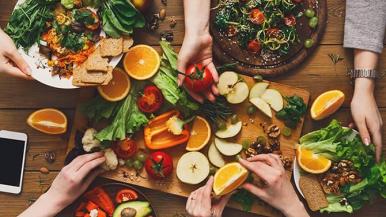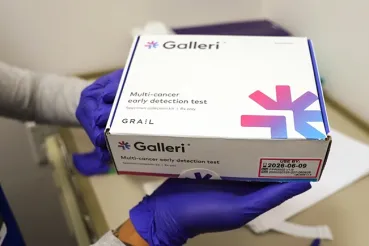Not only can eating healthful food help you feel good and look trim now, it can also help prevent health problems — including cancer — from popping up in the future.
But while researchers have provided a good general understanding of which foods to eat and which to avoid to help stave off cancer, the sheer number of studies featured in the news and on the Internet can be overwhelming — and may leave you wondering which advice is the best advice.
Here's what Christy C. Tangney, PhD, CNS, a nutritionist at RUSH, has to say:
What to eat
1. High-fiber foods
Foods rich in fiber include beans and other types of legumes, and whole grain cereals, breads and pastas. I advise adding one portion of any food in this category to every meal.
2. Soy
Also recommended: soy beans and soy products. Results from a past study of breast cancer survivors in the United States and China suggest that daily consumption of more than 10 milligrams of isoflavone, a compound found in soy, reduces the chance of cancer recurrence.
The reason: There are two estrogen receptors in the human body, alpha and beta. If a compound binds to the alpha receptor, it may increase the risk of breast cancer; binding to the beta receptor appears to have the opposite effect, and isoflavones preferentially bind to the beta receptor.
The protective nature of isoflavones was reinforced in a recent study looking at a large, ethnically diverse group of women with breast cancer living in North America; the study, published in the journal Cancer in March 2017, found that a higher dietary intake of isoflavone was associated with 21 percent reduction in mortality from all causes. It is important to note that the lower mortality with higher isoflavone intake was limited to women who had tumors that were negative for hormone receptors and those who did not receive hormone therapy for their breast cancer.
One cup of soy milk gives you a touch more than 10 milligrams of isoflavone, so try replacing cow's milk with soy milk in your morning cereal, or blend soy milk with your favorite fruits to make a smoothie.
If you're concerned, however, talk to your oncologist or the dietitian at your cancer treatment facility — especially if you have hormone-receptor-negative breast cancer or have been treated with hormone therapy. Your health care team can give you advice, based on your specific tumor type and overall health, on whether you should limit or avoid soy.
2. Fruits and vegetables
Numerous studies have linked diets rich in fruits and vegetables with an increased survival rate after cancer diagnosis and treatment. A recent study found that eating cruciferous vegetables — which include cauliflower, cabbage, broccoli and similar green leafy varieties — during the first 36 months following breast cancer is associated with a lower risk of death.
Consume fruits and vegetables liberally, aiming for 2 to 3 cups of nonstarchy vegetables (instead of starchy vegetables such as potatoes and corn) along with 1½ to 2 cups of fruit each day.
And look for a variety of colors when choosing these items. In particular, berries and other darkly colored fruits are packed with protective antioxidants.
3. Water
Drinking enough water each day may reduce your risk of developing colorectal cancer, breast cancer and prostate cancer — all of which rank among the most deadly forms of the disease. Staying hydrated helps your body's organs function properly, while dehydration can compromise your immune system.
What to avoid
1. Large quantities of red meat
There’s roughly 20 years of data showing that those who consume the most red and processed meat are more likely to die from cancer, particularly colorectal, prostate and stomach cancers.
You should consume no more than 18 ounces — roughly the size of six decks of playing cards — of red meat per week and little, if any, should be processed. Processed meats include sausage, hot dogs and deli meats.
Multiple studies have linked alcohol intake and cancers of the mouth, larynx, esophagus, liver and breast. And because alcohol can slow down your body's ability to heal, it definitely shouldn't be consumed during cancer treatment.
2. Excessive alcohol
Limit alcohol consumption to two drinks a day for men and one drink a day for women.
Multiple studies have linked alcohol intake and cancers of the mouth, larynx, esophagus, liver and breast. And because alcohol can slow down your body's ability to heal, it definitely shouldn't be consumed during cancer treatment.
3. Dietary supplements
An estimated 50 to 60% of people in the U.S. take one or more supplements, including 80 to 90% of cancer survivors. But the supplements may not help.
The problem is that companies do not have to demonstrate to the Food and Drug Administration that supplements are beneficial. These companies just have to prove there's no harm in taking supplements.
We need to realize that supplements aren't the answer. It's a healthier diet that's important. It's up to health professionals to be more assertive in educating patients based on the research, and for patients to talk to their doctors before starting to take supplements.
For instance, a recent study found no benefit to selenium and vitamin E in preventing prostate cancer. In fact, the study found a higher risk of developing prostate cancer among participants who took these supplements, and men in the study who took selenium also had a higher risk of developing diabetes.
A separate study followed cancer survivors who took a full range of supplements, including multivitamins, and found there was no decrease in death rates for supplement users.
Doctors should do everything they can to provide the best possible lifestyle nutrition information to patients who are undergoing or have just finished cancer treatment.
And this advice isn't just for cancer patients or survivors. Anyone who adheres to a balanced diet will see the health benefits and will lower the risk not just of cancer, but of heart disease, diabetes and other serious health conditions.




